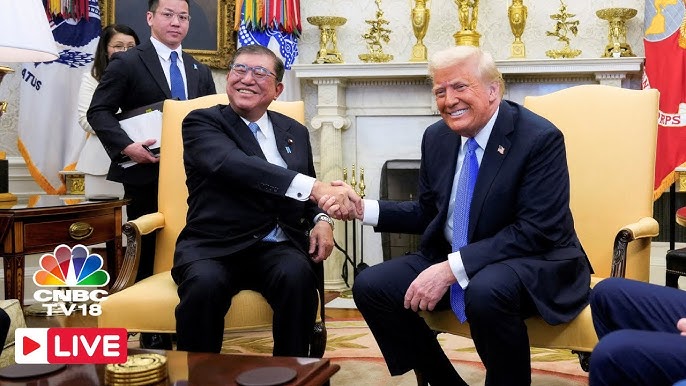A Crucial Meeting Between Allies
Japanese Prime Minister Shigeru Ishiba is meeting with US President Donald Trump at the White House on Friday to reinforce the strong alliance between the two nations. This visit marks the first by an Asian leader since Trump’s second administration began in January 2025.
US and Japanese officials say the talks will focus on economic and security issues, particularly North Korea’s nuclear threats, AI technology, and military cooperation. However, Ishiba has made it clear that his main goal is to build a personal connection with Trump, much like the bond Trump had with former Japanese Prime Minister Shinzo Abe.
Building a Strong Personal Relationship
Before leaving for Washington, Ishiba expressed his desire to establish a trusting relationship with Trump. He understands that a good personal bond with the US president could strengthen diplomatic ties and benefit Japan’s security and economic interests.
During Trump’s first term (2017-2021), he and Shinzo Abe developed a close friendship, often bonding over golf games and state visits. Abe’s tragic assassination in 2022 left a void in US-Japan relations. Now, Ishiba hopes to continue Abe’s legacy by ensuring a strong partnership with Trump.
To prepare for the meeting, Ishiba sought advice from Abe’s widow and former Prime Minister Fumio Kishida. He also studied past US-Japan diplomatic efforts to ensure a successful visit.
Economic Ties Take Center Stage
The US and Japan share a deep economic partnership, and Ishiba is expected to highlight Japan’s role as a top foreign investor in the US. For the past five years, Japan has been the largest foreign investor in the US. Japanese multinational companies create thousands of American jobs, particularly in the automobile and manufacturing sectors.
– In Kentucky alone, Japanese companies employ more than 45,000 workers.
– Japan is the largest job creator in 10 US states and the second largest in six others.
Trump and Ishiba will likely discuss trade agreements, semiconductor production, and artificial intelligence development, as both nations aim to stay ahead in global technology advancements.
Security and Military Cooperation
Military and defense cooperation will be a major topic during the meeting. Trump is expected to push Japan to increase its defense spending, similar to his demands on NATO allies. While Japan has recently raised its military budget to 2% of its GDP, Trump has called for all allies to contribute 5%.
Both leaders share concerns over North Korea’s military advancements and its growing ties with Russia. There is increasing fear that Russia may provide advanced missile technology to North Korea, which would pose a direct threat to Japan’s national security.
The US and Japan also plan to strengthen military training exercises between the US military and Japan’s Self-Defense Forces. This cooperation ensures that both nations remain prepared for potential threats in the Indo-Pacific region.
The Taiwan Question and Regional Stability
Another key issue on the table is Taiwan’s security. The US has long been committed to Taiwan’s defense, a position that Japan supports. However, tensions between China and Taiwan continue to rise, and both Trump and Ishiba must carefully navigate how to protect regional stability without escalating conflicts.
Japan remains concerned about China’s aggressive stance in the Indo-Pacific and its claims over disputed territories. The US-Japan alliance serves as a counterbalance to China’s growing influence in the region.
Trump’s Vision for a Stronger Alliance
Trump’s administration has described this meeting as being about “peace and prosperity” in the Pacific. His team insists that the US and Japan share common goals, including:
– Ensuring economic stability
– Preventing nuclear threats from North Korea
– Boosting advanced technology partnerships
– Strengthening military cooperation
While Trump’s demands for higher defense spending may pose a challenge, Japan remains committed to maintaining a strong alliance with the US.
A Meeting That Shapes the Future
This White House meeting is not just about diplomatic discussions—it is about shaping the future of US-Japan relations. As two of the world’s leading economic and military powers, the decisions made in Washington will have global consequences.
With security threats rising in Asia, and economic challenges ahead, both Trump and Ishiba must work together to ensure a stable, prosperous, and secure future for their nations and the wider Indo-Pacific region.

